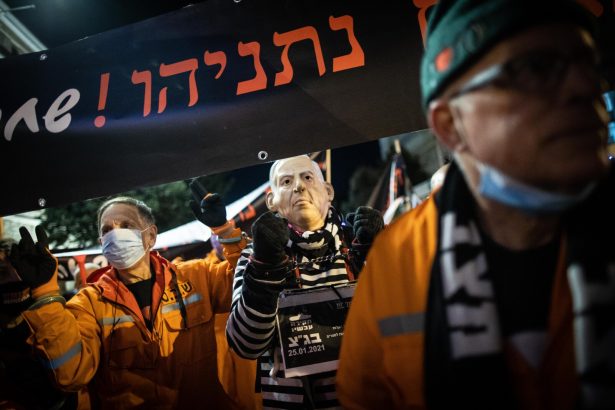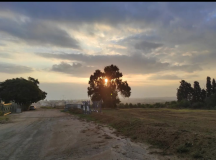Sam Shube of Nir Am in the Gaza Envelope argues the prime minister has become less a political figure than an identity marker, and that to unseat him at the next election, Bibi’s political opponents ought to shift the focus away from the man himself. ‘We must leave Bibi alone, once and for all,’ he concludes, ‘and allow Netanyahu’s politics of polarisation to collapse under its own dead weight.’
A Dividing Line on Highway 34
Just a few metres of asphalt on Route 34 separate Sderot from neighbouring kibbutzim. On 7 October, this road fused the entire area into a single killing field. When I evacuated Kibbutz Nir Am with my family late that night, the highway was a veritable scrapyard of demolished vehicles – upside down, crashed into the guard rails, many with victims still inside – a stream of destruction that swept residents of both banks along into a common, dystopian nightmare. For two years now, IDF artillery has rocked every home across a long arc of territory on the Gaza border, from Yad Mordechai to Kerem Shalom, while the thunder of exploding Iron Dome interceptors has formed the soundtrack of a fate shared by Sderot and nearby rural communities for over two decades. But on Saturday nights, when I join kibbutz members demonstrating at the Sha’ar HaNegev junction to cry out for the hostages, Route 34 again becomes a watershed. Alongside honks of solidarity, hecklers from cars heading toward Sderot – where 52 people were murdered on that Black Saturday – adversarially proclaim: ‘Just Bibi! Just Bibi!’
Beyond the Bibi Reflex
Here, then, lies another factor common to all residents of the Gaza envelope: Benjamin Netanyahu, the axis around which most folks define their political identity – either for or against. Notwithstanding Israel’s constantly shifting public discourse, the same antagonists face off at Sha’ar Hanegev Junction time after time. Before 7 October it was around Netanyahu’s judicial reforms, and anti-corruption protests brought people to the streets before that. Only Bibi himself remains constant. In November 2022, 79 per cent of Sderot residents voted for parties that comprise today’s governing coalition. Just across the road, Kibbutz Nir Am was a mirror image: only 20 per cent supported coalition parties, while 77 per cent voted for parties opposed to Netanyahu. At Kibbutz Mefalsim it was 14 per cent versus 83 per cent. At Or HaNer: 10 per cent vs. 88 per cent. Thus, despite identical security interests and a shared economic space in Israel’s southern periphery, the kibbutzim of the Gaza envelope voted like Tel Aviv and Ramat Hasharon in the centre of the country, while the towns of Sderot, Netivot, and Ofakim mirrored Kiryat Shmona in the far north.
These patterns do not reflect a structured ideological debate but rather a clash of identities. Netanyahu’s opponents – correctly, in my opinion – accuse him of enabling Kahanism, dismantling democratic institutions, and sacrificing hostages for the sake of coalition politics. But I also know people who hold disturbingly racist views and still viscerally oppose the Prime Minister. And the ‘Bibi reflex’ works both ways, with government supporters elevating Netanyahu to quasi-religious status. Publicist Avishai Ben Haim calls him ‘virtually a rabbi’ for his voters, and Maayan Israeli, head of Benny Gantz’s campaign, says ‘Bibi is a father figure’ to his base.
A Volatile Alliance
Israel’s right is far from homogenous, and tensions persist, just beneath the surface, between religious-settler factions and traditional Likud voters. Torah settlement groups – intentional communities with far-right politics and stringent religious observance – have increasingly moved into towns on the socio-economic margins such as Mitzpeh Ramon, Sderot, and Acco, shifting power relations and impacting on the school system. In his book City Without Memory, Prof. Motti Gigi compares their efforts to influence the hearts and minds of veteran, Mizrachi residents with those of left-wing activists in earlier years who sought to uplift the economically disadvantaged while preserving Ashkenazi cultural hegemony.
Putting it more bluntly, one life-long Likud voter – Yaakov Maslawi, says ‘our alliance with Religious Zionism and the Haredim is a tragedy for Second Israel’, a term popularised by Avishai Ben Haim for religiously traditional, right-leaning Mizrachi Jews. And yet the left, he argues (referring to the short-lived ‘change government’ in which Israel’s centre-left joined forces with former settler leader Naftali Bennet) ‘chose the settlers and the Torah settlement groups over us… We have no ideological dispute. Your debate with the settlers, by contrast, is ideological. And still the left won’t take a step in our direction.’ To be sure, Mizrachi Likud voters do not support Palestinian statehood, nor are human rights in the occupied territories at the top of their political agenda. But while the Torah settlement groups are preoccupied with every god-forsaken West Bank outpost (and are actively organising new groups to reestablish settlements in Gaza), ‘Paduel and Emanuel [two West Bank settlements] mean nothing to us,’ says Maslawi, ‘we don’t even know where they are.’ In the end, it boils down to identity, not policy. Prior to the anti-government protests of recent years, he claims, many in the Likud began to consider a future after Netanyahu. ‘But they pushed us back. When you call one of us a “Bibist,” he’ll just go back to his comfort zone and say, “I’m a Bibist? OK, so I’m a Bibist.”’[1]
Bridging the Divide
To escape the vice grip of identity politics, and to defeat Netanyahu, Israel’s opposition must move beyond years of personal attacks on Bibi and his family. Instead, we must focus on the weakest links in this nightmare of a governing coalition that has dragged us to the edge of an abyss: a finance minister who, oblivious to Israel’s crumbling credit rating, channels scarce budgets to artificial, Netanyahu-created ministries[2] serving narrow sectoral interests; a minister of social equality who openly proclaims that she’s (seriously, no joke) ‘proud to be a racist’; a national security minister with a criminal record, someone the IDF refused to even conscript, who has overseen a record surge in crime and murder rates; a minister for national missions who, in a fit of ideological depravity, called the period since the massacre of 1,200 Israelis a ‘miracle;’ and a minister of heritage who proposed dropping nuclear bombs on the Gaza Strip. Personal attacks on the prime minister, his wife’s haircut, or his son’s wedding, only reinforce the glue binding disparate government supporters together on the right.
Fundamentally, the bonds that tie folks on both sides of Route 34 are deeper than what divides us. On occasion, I follow the sunset up to a pastoral, wind-swept hill on the western extreme of my kibbutz overlooking the sand dunes where the battle for Nir Am took place on 7 October. Here, a simple memorial to our cousins, the Even-Segev family – murdered in Kibbutz Beeri – overwhelms me with its powerful silence. A five-minute drive across the highway takes me to the equally poignant, concrete memorial at the former site of the Sderot police station, destroyed in the fighting on 7 October. Sadly, divide-and-conquer politics are poisoning our very ability to mourn, leading Sderot and the kibbutzim to hold separate ceremonies last year. If this country is to rise above the bottomless pit of acrimony and mutual recrimination, we must leave Bibi alone, once and for all, and allow Netanyahu’s politics of polarisation to collapse under its own dead weight.
[1] Interviewed by Ran Shimoni in Haaretz on December 19, 2024 and the Haaretz This Week Podcast, December 31 st , 2024. Quotes from the podcast.
[2] Some examples: The Ministry of Settlement and National Missions; The Ministry for Jerusalem and the Tradition of Israel; the Ministry of Jewish Heritage.



































